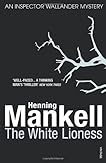 The White Lioness by Henning Mankell
The White Lioness by Henning MankellMy rating: 3 of 5 stars
Unlike most of Henning Mankell's "Wallander" novels, this one is set at least partly in South Africa, which gives it additional interest to me. It is set in the period between the release of Nelson Mandela from prison in 1990 and the first democratic elections in 1994. It was a period of great uncertainty, when no one knew quite what would happen. Though the National Party had already shed its ultra right wing (to the HNP in the late 1960s), and its far right wing (to the Conservative Party in the late 1970s), the bulk of its support was still pretty much on the right, and the unbanning of the left opposition parties tended to make its supporters nervous, including many in the security forces and the army. One of the possibilities was a right-wing military coup, and attempts to create disorder in order to facilitate such a coup. And there were such attempts, by the mysterious "third force", and others.
So Mankell's main plot, which is based on the training of a South African political assassin in Sweden, is quite believable. After all, Chris Hani was assassinated in just such a plot about the time that the novel was published. Mankell does a fairly good job of showing some of the tensions and ambiguities of South Africn society at that time.
But I also have the problem that I tend to read novels set in places that are familiar to me more critically, and tend to find it more jarring when things are oui of place. Because relatively few novels of this type are set in South Africa, its not something that happens very often, but I wonder how people who live in places where lots of crime novels are set feel when they read them. It's OK with Ruth Rendell's Inspector Wexford novels, which are set in a fictional town, but when actual places are mentioned, I wonder how people who live in them feel when there are inaccurate descriptions. Perhaps I'm also more sensitive to such things than most readers, having worked as a proofreader and editor, where it was my job to detect and correct such slip-ups.
Another novel I read, set in the same period, and with a similar plot line, was Vortex by Larry Bond, which was spoilt for me because some of the action took place in locations that were geographically impossible.
At first Henning Mankell's slip-ups were relatively minor -- a car parked under a baobab tree in the Transkei (I've never seen a baobab tree in the Transkei), someone working on a mine in Verwoerdburg (I lived there in the 1980s, and there were no mines there then). These are minor errors, and concerned only minor characters, but they are jarring none the less.
But there were some things that did affect more important characters, and the plot.
One is that Mankell refers to the "Transkei Province", where it affects police looking for suspects in the Transkei. Yet at that time Transkei was an "independent" homeland, and though its independence wasn't recognised by anyone but South Africa, police procedures at that period would surely have to take some account of the "independent" status of the Transkei, and so in a novel whose genre is a "police procedural" rather than a whodunit, this is a more serious error.
Some of Mankell's descriptions of African culture also strike me as somewhat odd. South Africa is a very multicultural country, and I'm not familiar with every single cultural nuance out there, but still, I wonder what Mankell's conception of a sangoma is. He has characters talking about "my sanhoma" the way some Americans talk about "my shrink", and though there are some ways in whch a sangoma's role in South African society is similar to that of a shrink in America, I've never heard anyone speak of "my sangoma. Mankell also writes about people's relations to spirits that also don't fit, especially since the character in question is a Zulu, and one of the better books on the topic, Zulu thought-patterns and symbolism was written by a fellow Swede, Axel-Ivar Berglund.
Mankell also has urban African characters using using rural imagery of wild animals. I think he underestimates the extent of urbanisation in South African society. I once took a group of students to a work camp in rural Zululand, and one of them, from Soweto, wondered how the local people could survive when they lived so far from the shops.
Never having been to Sweden, I have no idea whether there are similar discrepancies in the Swedish settings, but there do seem to be some rather large plot holes relating to the villain-in-chief, but to say more about that would reveal too much of the plot.
In spite of these flaws, however, it is an enjoyable read.
View all my reviews
No comments:
Post a Comment